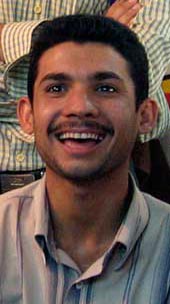 |
| An Iraqi man watches the trial in Karbala. (Reuters) |
Baghdad, Oct. 19 (Reuters): Saddam Hussein defiantly challenged the legitimacy of the US-backed court, but then entered a plea of not guilty as he went on trial today for crimes against humanity committed two decades ago.
After a three-hour hearing during which Saddam and his seven co-defendants, were charged with the murder of 148 Shia men, the chief judge adjourned the trial until November 28.
The judge, Rizgar Mohammed Amin said the main reason for the adjournment was that dozens of witnesses, some of them relatives of the men killed, had been too frightened to testify.
Grey-bearded and wearing a dark jacket over an open-necked white shirt, a proud Saddam harangued Amin from his seat inside a shoulder-high white metal pen on the floor. The other defendants sat quietly in other pens around him.
Asked by the judge for his full name, Saddam, 68, shot back: “You know me. You are an Iraqi and you know who I am. I won’t answer to this so-called court... Who are you? What are you?” Saddam said. “I retain my constitutional rights as the President of Iraq.”
Amin said: “You are Saddam Hussein al-Majid... former President of Iraq,” at which point Saddam raised his finger to interrupt, saying testily: “I did not say former President.” Saddam was the last to enter the marble-floored court before the trial began shortly after 0900 GMT.
“This is the first session of case number one, the case of Dujail,” Amin told the court, referring to the town where bloody reprisals followed an attempt on Saddam’s life on July 8, 1982.
The judge told the defendants the charges included murder, torture and forced expulsions, saying the crimes could carry the death penalty, and informed them of their rights, including a fair trial. In turn, Saddam first, they pleaded not guilty.
Then followed brief arguments by the defence and the prosecution, before the judge agreed to an adjournment, although he did not give the three months requested by Saddam’s lawyer.
Relief and anger
Many Iraqis watched with relief today as the trial began, bringing to account the man who brutalised them for three decades.
But others angrily dismissed the trial as a kangaroo court, declaring they did not recognise the US-backed case. Saddam's trial was broadcast on major TV stations. For many Iraqis, justice was sweet ? if long delayed. “I wish that I could judge Saddam with my own hands,” swore Krav Nahid, a Shia.










